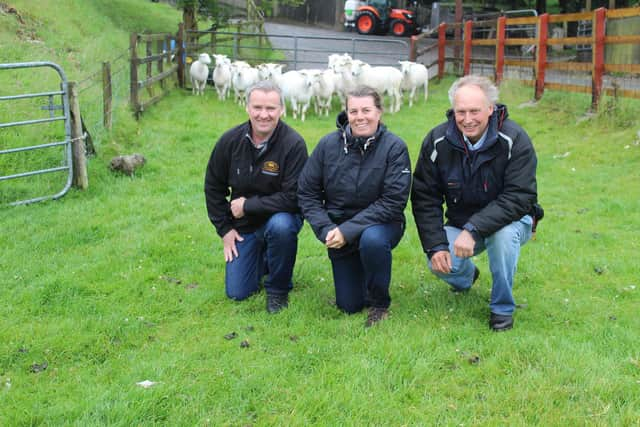New Zealand couple visit EasyCare flock
and live on Freeview channel 276
Their ‘Ipurua’ prefix is also synonymous with a high quality herd of South Devon cattle.
The other enterprise on the Foss farm is a 1500-strong of Romney ewes, which are crossed to a selection of wool shedding rams.
Advertisement
Advertisement
The enterprise comprises 1,400ac, rising from 100 feet above sea level to an altitude of 400 feet.


Peter and Caroline recently visited Ballycoose farm, close to Carncastle in East Co Antrim. Owned by Campbell and Isobel Tweed, Ballycoose is home to a flock of 3,000 EasyCare ewes.
The reason for the Foss visit centred on the renowned performance of the EasyCare bloodlines at Ballycoose plus the opportunity it offered to assess the potential suitability of the bloodlines within the flock to perform under the management conditions that prevail in New Zealand.
Peter takes up the story.
“We are committed to the development of a high quality, EasyCare production system within our overall farming operation.
Advertisement
Advertisement
“And it all comes down to one very simple fact. It costs NZ$5 to shear one animal, which will yield a fleece valued at around NZ$3. Wool production is a loss making operation for us.
“Under such circumstances, self shedding makes total sense.”
He added: “When we get back home, one of our first jobs will be that of getting a contractor engaged to shear 1,000 sheep.
“It’s an operation that will leave us with a net deficit of around NZ$2,000.”
Advertisement
Advertisement
All the sheep within the Ballycoose flock are performance recorded on a continuous basis.
Caroline commented:
“The flock has been recorded for the past 20 years. This represents a unique source of information, which can be used to make the best possible breeding decisions.
“It is this resource that we want to tap into.”
Another reason for the Foss visit is the fact that 30 EasyCare embryos, a number of which feature Ballycoose genetics, are due to be born on their farm over the coming weeks.
A mix of embryos and semen has been imported from the UK by Peter and Caroline over the past two years.
Advertisement
Advertisement
Ballycoose bloodlines were included in the specification agreed by the couple at the outset.
“The EasyCare lambs will be on the ground with the next few weeks. We are very keen to see how they perform for us,” Peter explained.
Campbell Tweed recognises that increasing numbers of farmers are now actively seeking comprehensive performance figures when it comes to deciding which new bloodlines best suit their flock development needs.”
The Ballycoose flock is totally self-contained with all lambs not going for breeding brought through to finishing weights.
Advertisement
Advertisement
The entire enterprise is managed by three full time staff. This, in itself, is a very powerful illustration of what ‘easy care’ sheep management is all about.
Campbell commented: “Each lamb is tagged at birth and, thereafter, electronically recorded on a regular basis throughout the period of its stay on the farm.
“From a breeding point of view, we cull on a consistent basis.
“Obviously, we will assist any ewe that has a problem lambing. However, that female and her lambs will not be retained for further breeding purposes. Nor will we sell these animals on to other breeders: they are all sent for slaughter at the appropriate time.
Advertisement
Advertisement
“We take a similar approach, where lameness is concerned. Obviously, any animal can succumb to a problem of this kind. However, if the issue arises again, after the initial treatment, it will not be retained for breeding.”
Campbell believes that EasyCare sheep have a key role to play on sheep farms of all types.
He added: “They are particularly suited to flock owners who work out from 9.00am to 5.00pm between Monday and Friday.”
Campbell is set to visit New Zealand over the coming days to see for himself how self shedding flocks are performing in that country.
Advertisement
Advertisement
Peter Foss concluded: “Three years ago, the number of EasyCare flocks in New Zealand was very small indeed.
“Since then we have see exponential growth. Campbell will be more than impressed with what he sees.
“And all of this can be attributed to the poor price of wool.”
Campbell Tweed will host an EasyCare open evening at Ballycoose on Tuesday, August 1st. Events get underway at 6.00pm.
Speakers taking part will include: Sam Boone, manager of Signet Breeding Services from AHDB and Ann McLaren, an animal breeding and genetics’ specialist with the Scottish Rural College (SRUC).